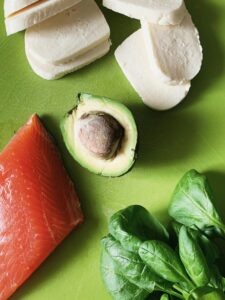EAT EVERY FEW (3-4) HOURS
 Now, before we go any further, it is important to know that we are not necessarily talking about eating a full meal every few hours – some of them can be smaller snacks or even just a shake. But you should be feeding the body every three to four hours. This would usually equate to about six small meals per day. And you could play around with this to see what suits you best. For instance, you may prefer to go for six small meals of about the same size, or maybe three medium-sized meals and three shakes might go down more easily.
Now, before we go any further, it is important to know that we are not necessarily talking about eating a full meal every few hours – some of them can be smaller snacks or even just a shake. But you should be feeding the body every three to four hours. This would usually equate to about six small meals per day. And you could play around with this to see what suits you best. For instance, you may prefer to go for six small meals of about the same size, or maybe three medium-sized meals and three shakes might go down more easily.
INCLUDE HIGH PROTEIN FOODS IN EACH MEAL OR SNACK.
Animal-based sources like chicken, beef, lamb, pork, fish, and dairy are the most protein-dense foods with the highest biological value. For vegetarians and vegans, your main sources are peas, beans, nuts and nut butters, quinoa, tempeh and tofu, and hemp. So ask yourself: Am I eating enough protein? If not, make the change.
DON’T FORGET YOUR VEGETABLES.
There are far too many health benefits to increasing your vegetable intake to go into here, but just make sure you consume some vegetables, especially those of the green leafy variety, with each meal or snack.
SAVE YOUR CARBS FOR AFTER EXERCISE.
You can get away with eating foods like rice, pasta, bread, potatoes, etc. if you eat them after you’ve exercised. Plenty of research shows that the body is better able to process carbohydrates in the 3 hour period following a bout of intense exercise. If you are gluten intolerant, avoid the pasta and bread.
INCLUDE A GOOD BALANCE OF HEALTHY FAT IN YOUR DIET.
 I know you may have been told to avoid fats in the past, but the truth is that dietary fat is absolutely essential to the proper functioning of our bodies. There are 3 types of fat: saturated, monounsaturated, and polyunsaturated. Eating all three kinds in a healthy balance can dramatically improve your health and actually help you lose fat. Most foods containing protein also contain some saturated fat and are also found in butter, avocados, and coconut oil. Your monounsaturated fat can be found in mixed nuts, olives, and olive oil and you will find polyunsaturated fat in flaxseed oil, fish oil, and mixed nuts.
I know you may have been told to avoid fats in the past, but the truth is that dietary fat is absolutely essential to the proper functioning of our bodies. There are 3 types of fat: saturated, monounsaturated, and polyunsaturated. Eating all three kinds in a healthy balance can dramatically improve your health and actually help you lose fat. Most foods containing protein also contain some saturated fat and are also found in butter, avocados, and coconut oil. Your monounsaturated fat can be found in mixed nuts, olives, and olive oil and you will find polyunsaturated fat in flaxseed oil, fish oil, and mixed nuts.
Following these basic guidelines can go a long way towards transforming the way you look, feel, and perform.
How a damaged gut leads to fat gain
How efficient is your digestion? We all know that good health is dependent on a healthy diet, that the food we eat is broken down in the gut and the nutrients extracted to feed our bodies. But what happens when this process is no longer functioning as it should?.
Every nutrient that you ingest must pass through the gut. If any type of malabsorption or dysbiosis (an imbalance between the good and bad bacteria) exists, all of the cells in the body will become deprived of nutrients needed for basic daily functions, like magnesium, zinc, and all of the B vitamins.
So, what causes this malabsorption or dysbiosis?
Malabsorption can be caused by decreased hydrochloric acid (stomach acid) production, insufficient bile salts, or decreased enzyme levels.
Dysbiosis occurs when the ratio of good to bad bacteria in the colon is altered, Two of the main causes of dysbiosis are the over-prescription of antibiotics and over-consumption of carbohydrates.
What has this got to do with fat loss?
Well, let’s take a look at the dysbiosis problem first. Your thyroid gland produces a hormone called T4 which is then converted to T3, the hormone responsible for boosting your metabolism. The good bacteria in your digestive tract is responsible for around 20% of that T4 to T3 conversion. So as you can imagine, a drop in the number of good bacteria inhabiting your gut can result in a slowdown of your metabolism, which in turn leads to an increase in fat storage.
A dysbiosis can also interfere with the mechanism by which estrogen is excreted from the body. This allows estrogen to re-circulate throughout the body, wreaking havoc, as excessively elevated estrogen causes an increase in inflammation and inhibits mitochondrial respiration, leading to decreased energy production as well as a decrease in overall tissue function. And to make matters worse, elevated estrogen can also prevent T4 from converting to T3, adding further to the metabolic slowdown and leading to hypothyroidism.
Do you have a Leaky Gut?
Under normal conditions, the food we eat is digested before passing into the bloodstream, but damage can occur to the lining of the stomach causing it to become more permeable, allowing undigested particles of food along with other substances such as yeast, toxins, and other forms of waste to enter the bloodstream.
As these particles are not supposed to be in the bloodstream, your body goes into action, treating them as it would any foreign invader.
First, your liver goes to work trying to remove the offending invaders. If it is too much for your liver to handle, your immune system then kicks in.
Eventually, this constant strain on your immune system can lead to a state of confusion in which your body starts to treat certain normally harmless food substances such as gluten, lactose (milk sugars), casein (milk protein), and others as invaders, further compounding the problem. This leads to autoimmune diseases such as chronic fatigue, MS, IBS, ulcerative colitis, and fibromyalgia, and the fatigue leads to less activity, allowing more fat to accumulate.
